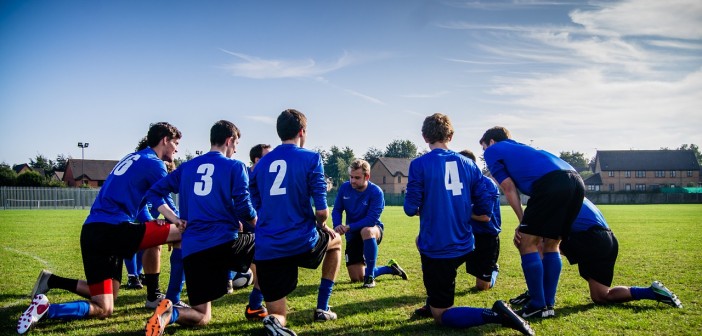It’s a common complaint among clergy types, “Sunday morning sports are taking people away from worship!” This lament and the exasperation that accompanies it go deeper than just whether a family shows up on a particular Sunday. It is the lament of the loss of the privileged place that the Church — and clergy — once enjoyed in our culture. And in our lament we risk alienating the very young families we seek to engage.
The problem is that our frustration, grief, and anger slip out in our preaching, conversations, and recruitment. It is guilt inducing, and we lose the grace we seek to extend to people.
The emergence of Sunday morning sports is just a symbol of a shift that’s happening in our society where the church is no longer given deference. Clergy resent this loss and mourn our own diminishing cultural position and privilege. That’s what I hear just under the surface when clergy complain to each other about Sunday morning sports — it’s the loss of our place, our privilege, our position. I mean, do you notice how we never complain about activities scheduled for Friday evenings for our Jewish friends or Saturdays for Seventh-Day Adventists, or how they interfere with Hindu or Muslim observances? Other traditions have had to deal with this a lot longer than the Church.
And, frankly, it’s not a bad thing for the Church to stand on its own, apart from cultural props. I don’t want the Church to be dependent on the world to say that Church is important. I want us to say that this is important because of Jesus, the persuasiveness of the Gospel, for its own sake, on its own terms, not because my local Recreation Department says so.
The problem is that our frustration, grief, and anger slip out in our preaching, conversations, and recruitment. It is guilt inducing, and we lose the grace we seek to extend to people. We have to watch our language, assumptions, and expectations, because most of them were formed in a culture that we don’t live in anymore.
Instead, we should save our lament for the families dependent on dual incomes, working two or more jobs, slammed with the cost of healthcare and education, who are consumed with kids’ activities, which are highly programmed because the world is not as safe as it was when we were growing up. Sometimes in our institutional need for attendance, volunteers, pledges, and relevance, we miss the needs and realities of our people.
The antidote is an understanding of vocation through which people see their entire lives — and not just time spent at or for the church — as their ministry. During the Reformation, Martin Luther argued that “a holy calling” was not just reserved for those in ordained ministry; it belonged to everyone. We call it the “priesthood of all believers,” but we often reduce the meaning of that to ministry done by lay people at, with, and for the church. Luther argued it extended far beyond church — into our homes, workplaces, and neighborhoods.
Rather than wishing away the changes in culture, but far from simply accommodating them, let’s find a third way to talk about the life of faith, one in which parents can see all the shuttling around they do, the homework help, getting kids dressed, and, yes, even watching their kid play hockey on Sunday morning as ministry in and of itself. Let’s make their time at church something that renews and strengthens them for their ministry of family and parenting, rather than making them feel guilty for wanting to be at their kids’ games. Here are some questions to spark your planning.
- Can we help people see their daily work — jobs, parenting, grandparents caring for grandchildren — as holy, sacred work? Can we help them claim their life’s work as ministry, as spiritual practice?
- How can our programming support this? I’m a fan of ministry that takes ministry beyond the church building to reinforce that God is present in neighborhoods, pubs, coffee shops, play grounds, social media — anywhere people spend time and gather.
- How can we enable people to volunteer remotely, via phone, smartphone, or laptop, when they can grab a few spare moments between activities or when the kids are down?
- Do we need to have an alternate worship time outside of Sunday morning? And what would that look like?
When I served at Harvard’s Memorial Church, my mentor Peter Gomes used to talk about the controversy that erupted at Harvard in the middle of the 19th century when Harvard stopped requiring its students to attend chapel. People mocked the decision and gave the school the moniker “Godless Harvard” — but many people continued to worship, and they knew why they were there, why they practiced their faith — not because they were required to, but because they wanted to and Harvard continues to have a vibrant worshipping community today.
We risk making the same quick judgment in our time — that this is just godlessness all around — for we too would be wrong. While the church and its clergy may have been displaced in our culture, God has not. God is where God has always been — embedded in the lives of God’s people. So, let’s stop complaining about Sunday morning sports and start helping make the connections between their faith and their daily work, their vocation.
Keith is a popular blogger on religion, new media, and popular culture at https://pastorkeithanderson.net from which this article is adapted.
Related Resources:
- Choosing Church … or Soccer, or Work, or Family Time, or… by Chris Duckworth
- Stewarding God’s Gift of Time by David Gray






